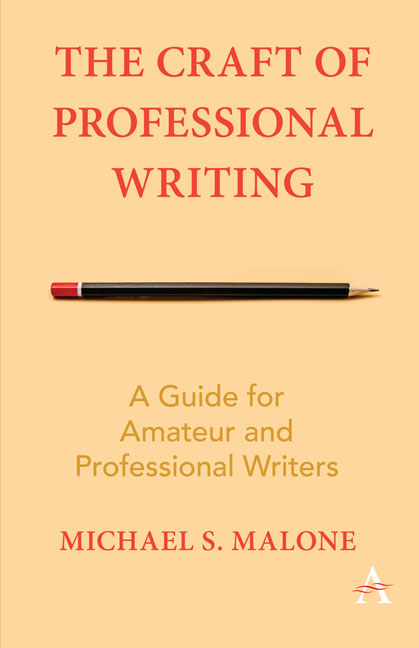Book contents
- Frontmatter
- Dedication
- Contents
- Introduction
- Part One Basics
- Part Two Corporate Careers and Disciplines
- Part Three Writing Careers in Media
- 8 Blogger
- 9 News Reporter
- 10 Critic
- 11 Essayist
- 12 Book Author
- 13 Television and Radio News Reporter
- 14 Screenwriter and Playwright
- 15 Fiction Writer and Novelist
- 16 Academic Track
- 17 Miscellaneous Writing
- Part Four The Work of Professional Writing
- Further Reading
- Suggested Assignments
- Index
13 - Television and Radio News Reporter
from Part Three - Writing Careers in Media
- Frontmatter
- Dedication
- Contents
- Introduction
- Part One Basics
- Part Two Corporate Careers and Disciplines
- Part Three Writing Careers in Media
- 8 Blogger
- 9 News Reporter
- 10 Critic
- 11 Essayist
- 12 Book Author
- 13 Television and Radio News Reporter
- 14 Screenwriter and Playwright
- 15 Fiction Writer and Novelist
- 16 Academic Track
- 17 Miscellaneous Writing
- Part Four The Work of Professional Writing
- Further Reading
- Suggested Assignments
- Index
Summary
What makes TV and radio news reporting different?
All writing is colored by the medium in which it appears, but with television and radio news, the writing is largely defined by the nature of those media. With television, almost all writing is subordinate to the visual imagery available, and the words almost always precede the image. As a result, television news reporting (as compared to print reporting) is typically more of a headline- and- caption production. In radio, the limitations are almost always due to time, as the spoken word is much slower than the read word. Also, in radio any nonverbal sounds (from real- life recordings to sound effects) are almost always subordinate to the spoken word— or used as a set- up to those words.
Why pursue a TV or radio news- writing career?
One reason is that television and radio news— especially the former— are just more glamorous than print. That's because an on- air face or voice is much more individualized than a simple print byline. Still, as the years pass, the three media are growing closer together as the Web enables television and radio reporters to write in a longer format; and print reporters to go on- air with Web videos.
Television and radio news also typically reaches a larger audience than print, especially in an era when newspapers are fading and dropping editions, and television and radio news is extending across the 24- hour cycle. Also, because of the delays created by press runs, TV and (even more) radio news is typically more timely, with updates and breaking news presented throughout the day.
But perhaps the most important reason for pursuing television or radio journalism over print is the personal connection you make with your audience. This is especially true with television, where viewers can come to believe they actually know you— and will sometimes come up and talk to you in public places as if you are an old friend. That can be irritating, but if you have the right, outgoing, personality becoming a local celebrity can be an added reward. That kind of attention almost never happens with print reporters, even popular columnists.
- Type
- Chapter
- Information
- The Craft of Professional WritingA Guide for Amateur and Professional Writers, pp. 195 - 208Publisher: Anthem PressPrint publication year: 2018



